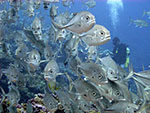Ichthyologist
Description
 Ichthyology is the branch of biology devoted to the study of fishes. Scientists have described over 32,000 living fish species. While a large number of species have been described, new species continue to be discovered each year.
Ichthyology is the branch of biology devoted to the study of fishes. Scientists have described over 32,000 living fish species. While a large number of species have been described, new species continue to be discovered each year.
Ichthyologists study all aspects of fish biology including anatomy, behavior and environment of fishes, how fishes interact with other organisms. Ichthyologists may focus their work in a variety of areas including behavioral ecology; reproductive biology/ecology; evolutionary ecology; food web interactions; fish movements; population dynamics; fisheries stock assessments, recruitment dynamics, evolution and systematics; conservation ecology; and fisheries policy. To do their work, ichthyologists may use a wide variety of research approaches from molecular biology to physiology to behavior. Many of these study areas are interdisciplinary. Ichthyologists may specialize by working with a specific species of interest. They may also focus their careers by choosing to work in education, research, or management.
Education Requirements
Estimated Salary
- B.S. in marine biology, biology, or related field for most entry level jobs
- Master’s degree is often needed for advancement
- PhD necessary for most independent research and for university-level teaching positions
For salary information, please visit the United States Bureau of Labor Statistics
Tasks and Duties
Ichthyologists may have a variety of responsibilities depending on the specific nature of their job. These could include:
- Design and conduct research
- Observe, identify, and describe various fish species
- Observe, identify, and describe fish behavior
- Observe, and describe fish physiology (e.g. reproduction, growth patterns)
- Collect and evaluate data
- Species ID, animal measurements, physiological samples
- Catalogue and maintain specimens (ichthyological collections)
- Write and publish scientific papers
- Attend seminars or industry events
- Give lectures and present findings to other industry professionals
- Provide conservation awareness
- Maintain and monitor laboratory and/or aquarium facilities (or one may oversee the management of laboratory/aquarium facilities)
- Teaching undergraduate and graduate courses (if in academia)
- Educate the public about fish biology/ecology/conservation
Knowledge and Skills
Basic skills may include:
- Research Skills
- Field observation and sampling
- Field research settings can range from tropical habitats to locations in extreme environments such as the deep sea or polar areas
- Experimental design and application
- Specimen collection and preservation
- Some positions may require specialized laboratory skills. (e.g. dissection, microscopy, gel electrophoresis, etc.)
- Field observation and sampling
- Computer skills
- Geographic Information Systems (GIS)
- Global Positioning Systems (GPS)
- Interpersonal Skills
- Networking with other scientists, biologists, and industry members (cooperation/collaboration)
- Ability to teach and mentor undergraduate and graduate students (university-level teaching positions)
- Open water diving skills and the necessary certifications may be required for some positions
- Ability to speak in a foreign language may also be helpful, especially if work is conducted in other countries.
May need knowledge in:
- Animal Behavior
- Anatomy/Physiology
- Biology
- Chemistry/Biochemistry
- Environmental Science
- Ecology
- Evolutionary Biology
- Marine Science
- Marine and/or freshwater fisheries biology
- Statistics
- Taxonomy and systematics
Connections to Underwater Acoustics
Fishes produce different types of sounds including grunts, croaks, clicks, and snaps. Sounds may be produced as signals to predators or competitors, to attract mates, or as a fright response. Sounds are also unintentionally produced as a by-product of feeding or swimming. Ichthyologists may study fish sound production and/or usage . Scientists can listen to fish vocalizations, identify species, and document fish distribution patterns, especially those related to spawning (reproduction). These data provide valuable information to resource managers overseeing natural resource policies on the marine environment.
In addition to studying the sounds that fish produce, ichthyologists may use acoustics in their field research to study and track fish species. Fish finders detect the presence of fish primarily by detecting the air in their swim bladders. Sonar systems that are especially designed to locate fish, transmit sound pulses, measure the time it takes for echoes to return from an object (fish), and calculate the distance to that object. Acoustic fish tags are used to monitor and track fish movement. Each fish tag is a transmitter that produces a unique sound. By listening with a hydrophone, the location and depth of a tagged fish can be determined.
Ichthyologists may also study the potential effects on fish from anthropogenic (human-generated) sounds, such as those associated with airguns and pile driving . Potential effects of sound on fish may include: death, tissue damage, temporary hearing loss; behavioral changes; and increased stress. There is also the potential for these sounds to have no effect on fish.
Related Careers
- Acoustician
- Biological Oceanographer
- Ecologist
- Fisheries Observer
- Fisheries Scientist
- Limnologist
- Marine Biologist
- Zoologist
DOSITS Links
Animals and Sound
Importance of Sound > Why is sound important to marine animals?
Use of Sound > How do marine animals use sound?
Use of Sound > How do marine fish communicate using sound?
Sound Production > How do fish produce sound?
Effects of Sound > Potential effects of sound on marine fishes
People and Sound
Fishing > How is sound used to locate fish?
Fishing > How is sound used to identify fish?
Investigate Marine Animals > How is sound used to study the distribution of marine fishes?
Technology Gallery
Observing and Monitoring Marine Animals > Fish Finding Sonar
Observing and Monitoring Marine Animals > Acoustic Fish Tags
Observing and Monitoring Marine Animals > Archival Marine Acoustic Recording Units (ARUs)
Resources
The American Society of Ichthyologists and Herpetologists
Florida Museum of Natural History: Careers in Ichthyology
Education Portal: Ichthyologist
Animal Careers: Ichthyologist